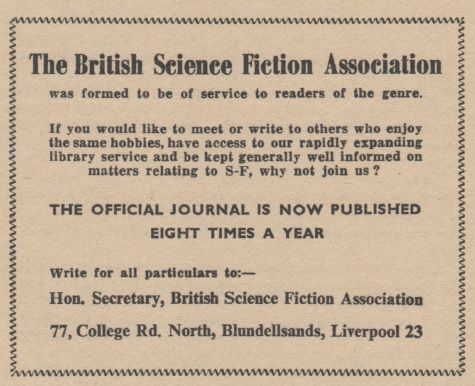[While you're reading this article, why not tune in to KGJ, Radio Galactic Journey, playing all the current hits: pop, rock, soul, folk, jazz, country — it's the tops, pops…]

by Gideon Marcus
Overcoming prejudice
Once, I was a snob.
For the most part, I was raised on a steady diet of L. Frank Baum, Edgar Rice Burroughs, and H.P. Lovecraft. I devoured the complete canons of each. I also enjoyed the superhero comics of the war years — who doesn't like watching Captain America slug Nazis? But after the war, I was getting tired of the pulps, and comics were getting tired. I wanted something new.

Then, 'round 1950, I discovered science fiction digests — grown-up mags like Galaxy and Fantasy and Science Fiction — and my snobbish attitude was firmly established. It didn't help that comics had entered a real slump by the 1950s, with National Comics (DC to the hep kids) in a rut and Atlas running Westerns and half-bit anthologies. With the demise of the American News Company, Atlas went the way of the dodo, along with most of the inferior digests. Survival of the fittest, right?
So I certainly didn't expect that I would find myself getting into those very same comics I'd once turned my nose at. I first took notice when Marvel Comics arose from the ashes of Atlas Comics and started publication of The Fantastic Four. Not only did this mag showcase the talents of Jack Kirby, the fellow who invented Captain America, but it featured a more realistic team dynamic than I'd ever seen before. Why, these folks hardly even liked each other sometimes. I appreciated the dilemma of The Thing, a hideous rock monster who nevertheless wasn't keen on returning to his human form, lest he give up his evil-clobbering powers.

Then came The Amazing Spiderman and The X-Men, and I was hooked. I sang Marvel's virtues and scoffed at the kiddie fare that DC was peddling. Around that time, I picked up an adversary, a Mr. Jason Sacks who delighted in telling me how wrong-headed my tastes were.

Late last year, Jason and I decided, unlike Tareyton smokers, that we'd rather switch than fight. You see, Jason had discovered the charm of the new line-up of Marvel superheroes, and I was taken with D.C.'s new X-men-like group, the Doom Patrol. Instead of picking a side, why not enjoy the virtues of both?
State of the Union
Here in March 1964 (May on the comics I buy at the news stand), Marvel's line-up has fully flowered. The newest member of the superhero pantheon is Matt Murdock, a blind attorney whose other senses have compensated to such a degree (sounds inspired by Galouye's Dark Universe doesn't it?) that he is able to fight crime as The Daredevil! The debut issue of this hero, written by Stan Lee and drawn by Bill Everett, was a hoot, and I look forward to the next.

Sidebar: I'm impressed that both comics houses are exploring the idea of handicapped heroes: Daredevil is blind, Professor X and The Chief (leaders of the X-Men and the Doom Patrol) both use wheelchairs, Thor's human form requires a cane, The Thing, Doom Patrol's Automaton and Negative Man and X-Men's Angel all have obvious physical peculiarities that make them stand out. This makes for more mature storylines, and those of us with some kind of disability find a measure of comfort in having these folks with whom to identify.

Spiderman, a Stan Lee/Steve Ditko effort, continues to entertain. This month's issue, #8, features the return of Dr. Octopus and spotlights the problem of recidivism amongst supervillains.

Both Fantastic Four (Lee/Kirby) and Spiderman demonstrate Marvel's increasing reliance on multi-book story arcs. It's funny to think that two stories per issue used to be the norm — now it might take several issues to wrap up a plotline. Speaking of Fantastic Four, in issue #24, the Thing goes toe to toe with the Hulk in a match-up every bit as exciting as the recent Heavyweight Championship between Cassius Clay and Sonny Liston.

Avengers (Lee/Kirby) is a bi-monthly, like X-Men; in the last issue (#4), Captain America was thawed from the ice in which he's been frozen since World War 2. I can't tell you how excited I am to have Cap back, and I urge you to check it out.

As for the "anthologies," these are increasingly becoming character books, and I have to wonder if they will just get renamed for the hero that stars in them. For instance, Strange Tales has become the home of the mysterious Dr. Strange, although this issue also features a popular rivalry/team-up: the flaming Torch and the frozen Turd…er… Ice Man!

Journey into Mystery #103 is Thor's mag.

Tales of Suspense #52 stars Iron Man fighting the Black Widow, and an immortal alien called The Watcher.

I'm always happy to see the Wasp, and she got an outing with her beaux, Giant Man, in Tales to Astonish #54.

And then there is the host of girls comics featuring the latest in fashion:

Let's not forget the western titles, which I don't bother with, but which still linger on.

For the WW2 buffs who don't get enough from DC's Sgt. Rock, this month's Sgt. Fury and his Howling Commandos is a riveting courtmartial drama.

Finally, I want to give recognition to the fellows who most often go unsung, the Letterers: Sol Rosen and Art Simek. Without them, comics would be just a bunch of pictures.

Oh, and what do we have here? Mr. Sacks is invoking the Fairness Doctrine and wants to tell us all about the state of National Comics. Well, why not?
Better Read than Dead

by Jason Sacks
The big comic news for me in ‘64 is that the Doom Patrol have finally emerged into their own title. Moving out from an anthology slot in My Greatest Adventure, these oddball adventurers continue to delight. Thankfully National has identified the artist on this sterling series as Bruno Premiani, and the Italian master delivers fascinating tales of “The world’s strangest heroes.” For a change such a blurb is accurate, as the weird Negative Man, charmingly acerbic Robotman and enchanting Elasti-Girl continue working for the mysterious chief. It’s similar to Marvel’s much duller X-Men — though the similarities are apparently an accident of timing, if you believe the fanzines — but more insightful and stranger.

Recently, Hawkman debuted his own solo comic after a series of showcase appearances in Mystery In Space. National editor Julius Schwartz’s latest resurrection of a long-forgotten Golden Age character, the new Hawkman is an alien from the delightfully named Thanagar, working on Earth as a museum manager and in the stars as a great space policeman. The art, most likely by Murphy Anderson, is all National Comics smoothness and ease, making the winged wonder’s adventures a thorough delight.

With Hawkman moving out from Mystery in Space, that anthology series is now devoted to full-length tales featuring the hero of Rann, Adam Strange. With sleek, moderne art by Carmine Infantino, well known for his fabulous Flash, this thrilling series mixes astounding adventure with a smart space romance for a surprisingly heady mix that even adults can enjoy.

It’s not all greatness for National in ‘64, though. Editor Mort Weisinger continues his stultifyingly stale children’s stories in the Superman titles, while Metal Men is seldom as clever as it wants to be and Wonder Woman is so dull even my kid sister won’t pick it up. Worst of all are Batman and Detective Comics. A recent issue of Detective, issue #326, shows the nadir of this abysmal series with the pathetically stupid “Captives of the Alien Zoo,” a story so dumb and so contrived that it should result in the immediate firing of everyone responsible for its creation. Compared to that, even Archie Comics’ idiotic Adventures of The Fly seems like the work of a genius.

Overall DC is following some of the same trends Marvel has embraced recently. For one thing, a reader has to wonder if anthology series are on their way out. My Greatest Adventure disappeared while others, like Mystery in Space and House of Secrets (with the intriguing Eclipso), are going full action hero. In other ways National blazes their own trail. That company continues to have a wider diversity of titles than Marvel – hardly a surprise with the larger set of titles they deliver each month. Humor and romance still have their place with the likes of Jerry Lewis, Bob Hope, Girls’ Love Stories and Secret Hearts. As usual with National all their titles demonstrate that traditional sheen of professionalism Marvel often lacks. Will kids go for smoothness over unpredictability in ‘64? Only time will tell.

[And that's our comics round-up for San Diego Comic Fest! If I met any of you folk this weekend, please drop me a line. I'd love to hear from you.]

![[March 7, 1964] Look both ways (Marvel and National Comics round-up)](https://i0.wp.com/galacticjourney.org/wordpress/wp-content/uploads/2019/02/640301dd.jpg?resize=672%2C372)

![[March 5, 1964] Brushwinged, I Soar (Hannah Green's I Never Promised You a Rose Garden)](https://i0.wp.com/galacticjourney.org/wordpress/wp-content/uploads/2019/03/640305RoseGarden_Cover.png?resize=383%2C372)


![[March 3, 1964] Out and about (March 1964 <i>Analog</i>)](https://i0.wp.com/galacticjourney.org/wordpress/wp-content/uploads/2019/03/640303cover.jpg?resize=460%2C372)








![[February 29, 1964] Think Twice — it's not all right (<i>The Twilight Zone</i>, Season 5, Episodes 17-20)](https://i0.wp.com/galacticjourney.org/wordpress/wp-content/uploads/2019/03/640229f.jpg?resize=672%2C372)







![[February 27, 1964] Beatles, Boredom and Ballard ( <i>New Worlds, March 1964</i>)](https://i0.wp.com/galacticjourney.org/wordpress/wp-content/uploads/2019/02/640227cover.jpg?resize=649%2C372)








![[February 25, 1964] From the Sublime to the Ridiculous (<i>Castle of Blood</i> and <i>The Incredibly Strange Creatures Who Stopped Living and Became Mixed-Up Zombies</i>)](https://i0.wp.com/galacticjourney.org/wordpress/wp-content/uploads/2019/02/640225blood.jpg?resize=350%2C372)
















![[February 23, 1964] Songs of Innocence and of Experience (March 1964 <i>Fantastic</i>)](https://i0.wp.com/galacticjourney.org/wordpress/wp-content/uploads/2019/02/640223cover.jpg?resize=672%2C372)









![[February 21, 1964] For the fans (March 1964 <i>Fantasy and Science Fiction</i>)](https://i0.wp.com/galacticjourney.org/wordpress/wp-content/uploads/2019/02/640219cover.jpg?resize=665%2C372)


![[February 19th, 1964] The Edge Of Disappointment (<i>Doctor Who</i>: The Edge Of Destruction)](https://i0.wp.com/galacticjourney.org/wordpress/wp-content/uploads/2019/02/640219stabbystabby.jpg?resize=672%2C372)






![[February 17, 1964] Breaking Taboos (April 1964 <i>Worlds of Tomorrow</i>)](https://i0.wp.com/galacticjourney.org/wordpress/wp-content/uploads/2019/02/6312017cover.jpg?resize=672%2C372)





